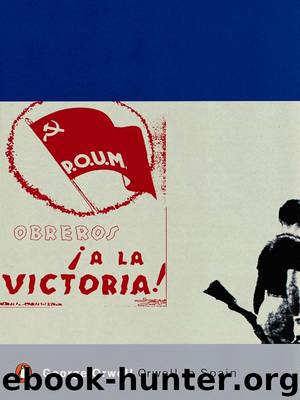Orwell in Spain by George Orwell

Author:George Orwell [Orwell, George]
Language: eng
Format: epub
ISBN: 9780141926667
Publisher: Penguin Books Ltd
Published: 2010-03-14T16:00:00+00:00
APPENDIX II
[Formerly Chapter XI of the First Edition, placed between Chapters IX and X of this edition at Orwell’s request, preceded by the final paragraph of Chapter X of the First Edition (Chapter IX of this edition)]
If you are not interested in political controversy and the mob of parties and sub-parties with their confusing names (rather like the names of the generals in a Chinese war), please skip. It is a horrible thing to have to enter into the details of inter-party polemics; it is like diving into a cesspool. But it is necessary to try and establish the truth, so far as it is possible. This squalid brawl in a distant city is more important than might appear at first sight.
It will never be possible to get a completely accurate and unbiased account of the Barcelona fighting, because the necessary records do not exist. Future historians will have nothing to go upon except a mass of accusations and party propaganda. I myself have little data beyond what I saw with my own eyes and what I have learned from other eye-witnesses whom I believe to be reliable. I can, however, contradict some of the more flagrant lies and help to get the affair into some kind of perspective.
First of all, what actually happened?
For some time past there had been tension throughout Catalonia. Earlier in this book I have given some account of the struggle between Communists and Anarchists. By May 1937 things had reached a point at which some kind of violent outbreak could be regarded as inevitable. The immediate cause of friction was the Government’s order to surrender all private weapons, coinciding with the decision to build up a heavily-armed ‘non-political’ police-force from which trade union members were to be excluded. The meaning of this was obvious to everyone; and it was also obvious that the next move would be the taking over of some of the key industries controlled by the CNT. In addition there was a certain amount of resentment among the working classes because of the growing contrast of wealth and poverty and a general vague feeling that the revolution had been sabotaged. Many people were agreeably surprised when there was no rioting on 1 May. On 3 May the Government decided to take over the Telephone Exchange, which had been operated since the beginning of the war mainly by CNT workers; it was alleged that it was badly run and that official calls were being tapped. Salas, the Chief of Police (who may or may not have been exceeding his orders), sent three lorry-loads of armed Assault Guards to seize the building, while the streets outside were cleared by armed police in civilian clothes. At about the same time bands of Assault Guards seized various other buildings in strategic spots. Whatever the real intention may have been, there was a widespread belief that this was the signal for a general attack on the CNT by the Assault Guards and the PSUC (Communists and Socialists).
Download
This site does not store any files on its server. We only index and link to content provided by other sites. Please contact the content providers to delete copyright contents if any and email us, we'll remove relevant links or contents immediately.
| Afghan & Iraq Wars | American Civil War |
| American Revolution | Vietnam War |
| World War I | World War II |
Waking Up in Heaven: A True Story of Brokenness, Heaven, and Life Again by McVea Crystal & Tresniowski Alex(37801)
Empire of the Sikhs by Patwant Singh(23080)
We're Going to Need More Wine by Gabrielle Union(19041)
Hans Sturm: A Soldier's Odyssey on the Eastern Front by Gordon Williamson(18584)
Leonardo da Vinci by Walter Isaacson(13324)
The Radium Girls by Kate Moore(12023)
Tools of Titans by Timothy Ferriss(8380)
Educated by Tara Westover(8052)
How to Be a Bawse: A Guide to Conquering Life by Lilly Singh(7482)
Permanent Record by Edward Snowden(5843)
The Last Black Unicorn by Tiffany Haddish(5635)
The Rise and Fall of Senator Joe McCarthy by James Cross Giblin(5279)
Promise Me, Dad by Joe Biden(5150)
The Wind in My Hair by Masih Alinejad(5093)
A Higher Loyalty: Truth, Lies, and Leadership by James Comey(4958)
The Crown by Robert Lacey(4813)
The Iron Duke by The Iron Duke(4352)
Joan of Arc by Mary Gordon(4107)
Stalin by Stephen Kotkin(3963)
